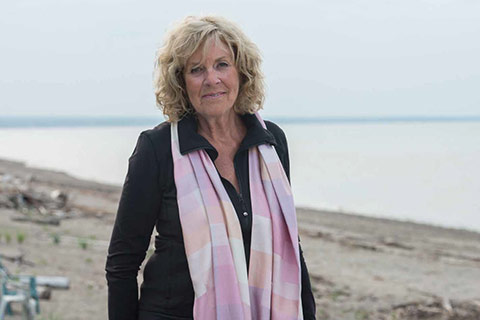As a journalist and human rights activist, Sally Armstrong (MSc 2001) has brought horrifying stories about the abuse of women to light from conflict zones around the world. And there has been no good news, she says, until now. Her message of hope for girls: There’s a shift happening – women are moving toward a tipping point. “Everyone – from presidents to pollsters and economists to policy wonks – is predicting that women are the way forward,” she says.
“About three years ago, I felt the earth was shifting under the status of women; stories were popping up all over the place.” Armstrong travelled to Meru, Kenya, a city north of Nairobi, to write a story for Chatelaine magazine about 160 girls, kids between the ages of three and 17, suing their government for failing to protect them from being raped. “I watched the drama unfold – the agony of these young victims and the empowerment they felt for taking action, something their grandmothers, mothers and aunties had never dared to do,” she says. And the ground did shift, as the judge delivered a guilty verdict in 2013. When Armstrong started doing more research, she found many more stories and a lot of evidence – enough to support her theory and write a book, Ascent of Women: A New Age is Dawning for Every Mother’s Daughter.
But why now? Armstrong credits the global commitment to the education of girls as a major factor. For instance, women in Afghanistan refer to their illiteracy as blindness. “I couldn’t read, so I couldn’t see what was going on,” one woman told her, describing how a lack of education has kept women in the dark for centuries. Armstrong says, “As more girls started going to school, they started to understand that they had been hoodwinked, and started to realize things like the fact that the holy book did not say they could not go to school – it was just what the elders were telling them.”
Another factor that Armstrong credits is the power of the Internet and social media. Facebook, Twitter, email and blogging mean nothing can be hidden any more, she says. The #BringBackOurGirls Twitter hashtag was launched after almost 300 girls were kidnapped in Nigeria this spring.
“Did the Twitter campaign work?” asks Armstrong. “We don’t have all the girls back, but it forced the Nigerian president to take help from other countries,” and, when U.S. President Barack Obama sent an interagency team to assist the Nigerian government with the search for the missing girls, he checked off a box in history that had always been empty. “It may not have the ending we hope for, but we should never forget it,” she says. “He showed the world that girls count – that’s the message and the lesson.”
As for the impact that she hopes her book will have, it’s simple, says Armstrong. “I hope the book will fuel the conversation that has started around the world – I wanted to tell women that they are winning.”
Recent Posts
U of T’s 197th Birthday Quiz
Test your knowledge of all things U of T in honour of the university’s 197th anniversary on March 15!
Are Cold Plunges Good for You?
Research suggests they are, in three ways
Work Has Changed. So Have the Qualities of Good Leadership
Rapid shifts in everything from technology to employee expectations are pressuring leaders to constantly adapt






One Response to “ Woman’s Time ”
The ripples continue ever outward!